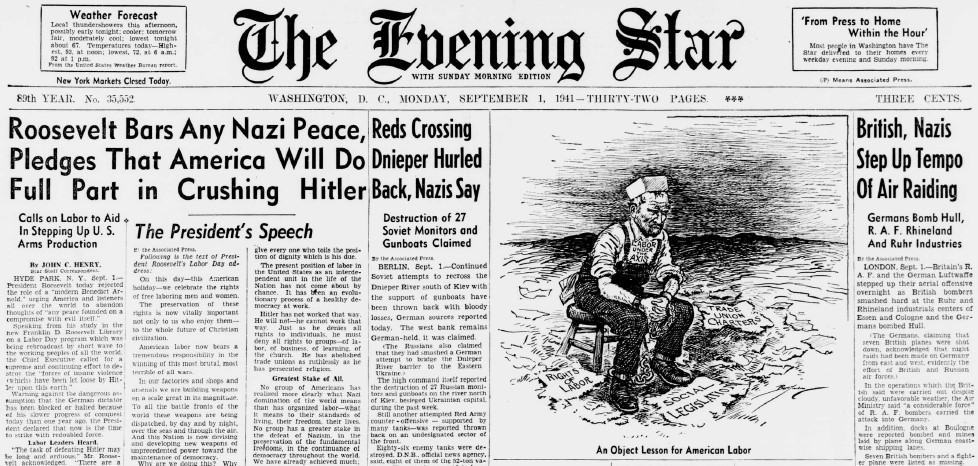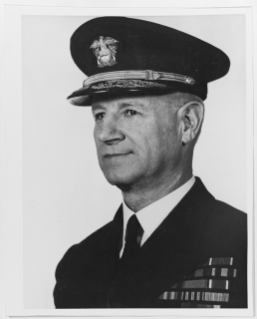World War II Chronicle: September 1, 1941
Click here for TODAY’S NEWSPAPER
Page 2 mentions an American citizen flying for the Royal Air Force’s Volunteer Reserve, Flight Officer Edward A. Morrison of No. 99 Squadron has earned the U.K’s Distinguished Flying Cross for his role in the July attacks against German battleships Gneisenau and Scharnhorst and the heavy cruiser Prinz Eugen.
Brig. Gen. Albert L. Cox, commanding general of the District of Columbia’s National Guard, is pictured on page 4 during an inspection. Cox played end for the University of North Carolina football team, earning All-Southern honors (similar to today’s All-America Team) and was also on the baseball and track varsity squads. After service on the Mexican border in 1916 as captain of Company B, 3rd North Carolina Infantry, Cox commanded the 113th Field Artillery and earned a Distinguished Service Cross during World War I.
His father was Confederate general William R. Cox, who led the last charge during the Battle of Appomattox. Albert retired in 1942, but sons Adm. William R. Cox and Col. Albert L. Cox, Jr. (USAF) followed in his footsteps. Both boys attended the U.S. Naval Academy, Albert flew bombers in Europe and William earned a Navy Cross as skipper of a destroyer in the Pacific Theater.
Sports section begins on page nine… Page 11 mentions the retirement of Rear Adm. Joseph K. Taussig. Adm. Taussig was the second of four generations of Taussigs to graduate from the U.S. Naval Academy. His father Rear Adm. Edward D. Taussig entered the academy during the Civil War, graduating in 1867. As commanding officer of the gunboat USS Bennington, He claimed Wake Island and took control of Guam for the United States. The Allen M. Sumner-class destroyer USS Taussig (DD-746) is named in his honor. Father and son both served in the Philippine-American War and the Boxer Rebellion — Joseph was part of the Seymour Relief Expedition and was wounded in the leg during an attack. Joseph commanded the first division of American destroyers overseas for World War I, earning a Distinguished Service Medal for an attack on a German U-boat.
Joseph had two public disputes with Franklin D. Roosevelt over Naval war preparedness: once just after World War I when FDR was Assistant Secretary of the Navy and a second time prior to World War II when FDR was president. Although naval treaties limited the United States in ways that Japan was not, history shows that we would have done well to heed his warnings regarding supplying American bases in the Pacific and to preparing defenses on the Philippines in response to Japanese aggression.
FDR wanted him fired, but Chief of Naval Operations Harold Stark intervened, and Taussig received a reprimand. His public predictions of an inevitable war with Japan came true. On Dec. 7, son Joseph Jr. (Class of ’41) was the officer of the deck for the battleship USS Nevada, and was seriously wounded during the attack. Refusing to leave his station until sailors forcibly removed him, Joseph Jr.’s leg was amputated and he was back to duty three days later. was awarded a Navy Cross and he was back to duty three days later. His son Joseph III served in the Marine Corps after graduating the Naval Academy.
Not mentioned in the papers: On this day, Germany orders that all Jews in the Reich wear the gold Star of David on their outer clothing. Meanwhile, at Auschwitz, the Germans have begun testing Zyklon B gas (hydrogen cyanide), using large groups of Soviet prisoners of war to determine its effectiveness for mass exterminations.

